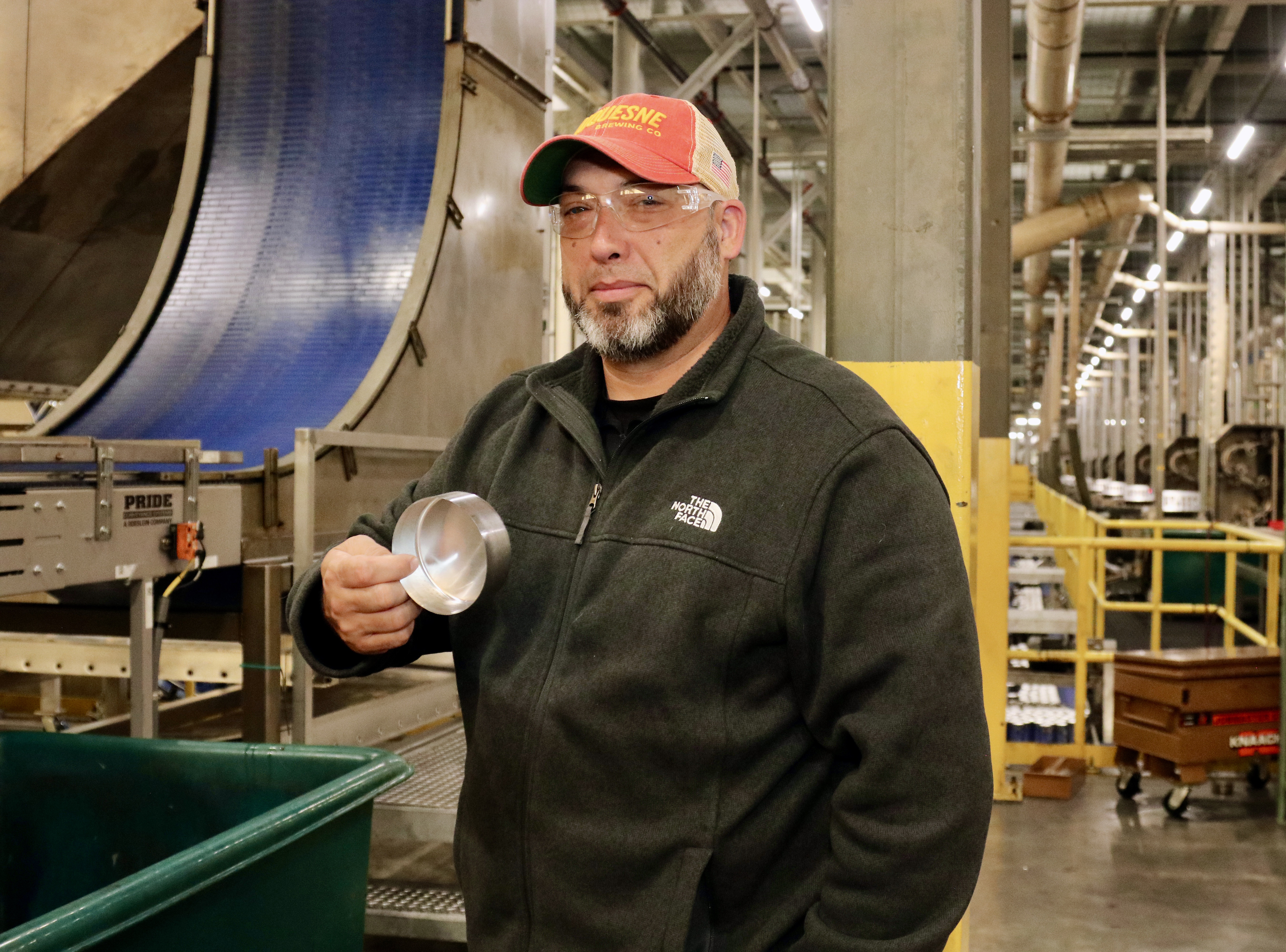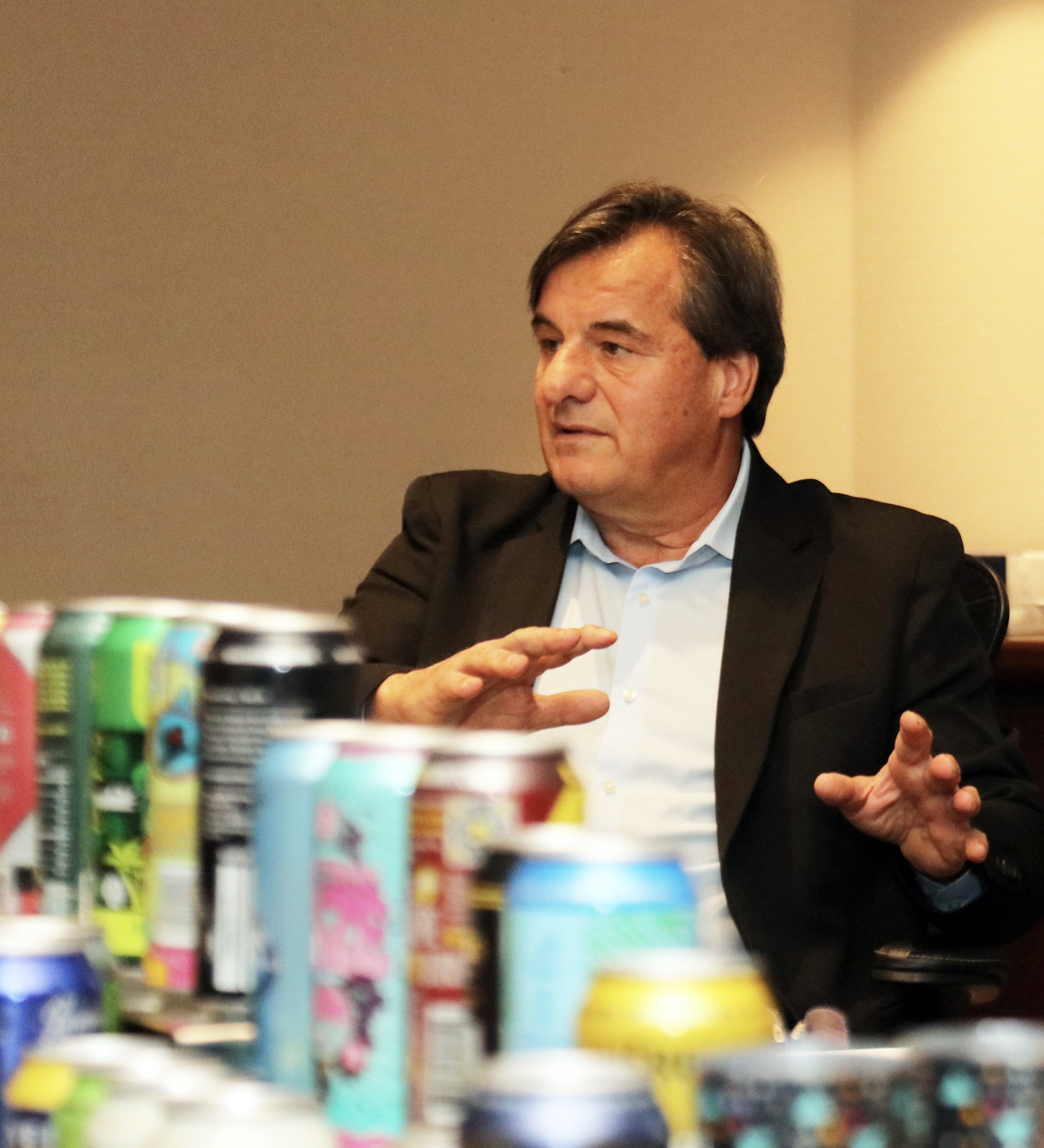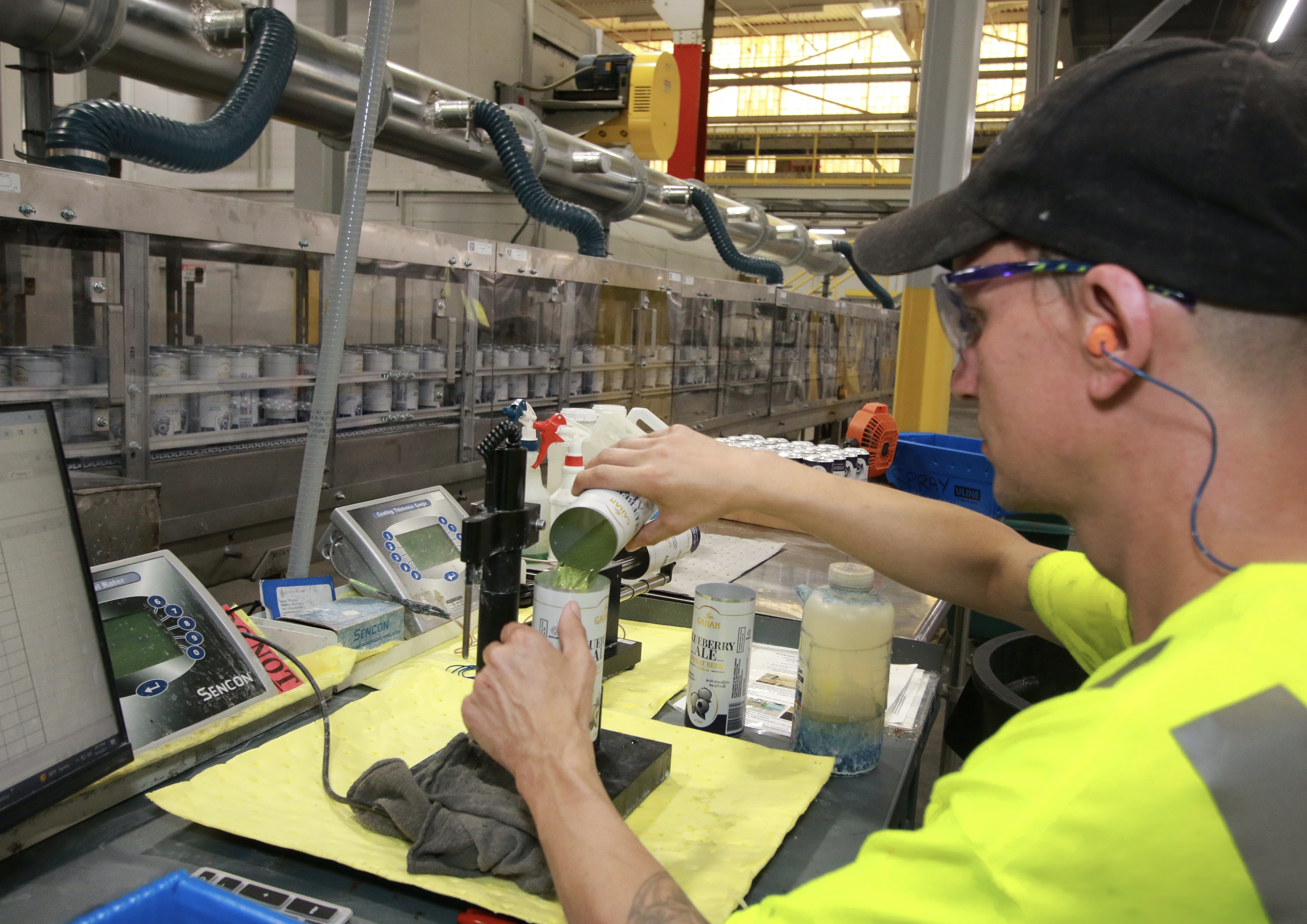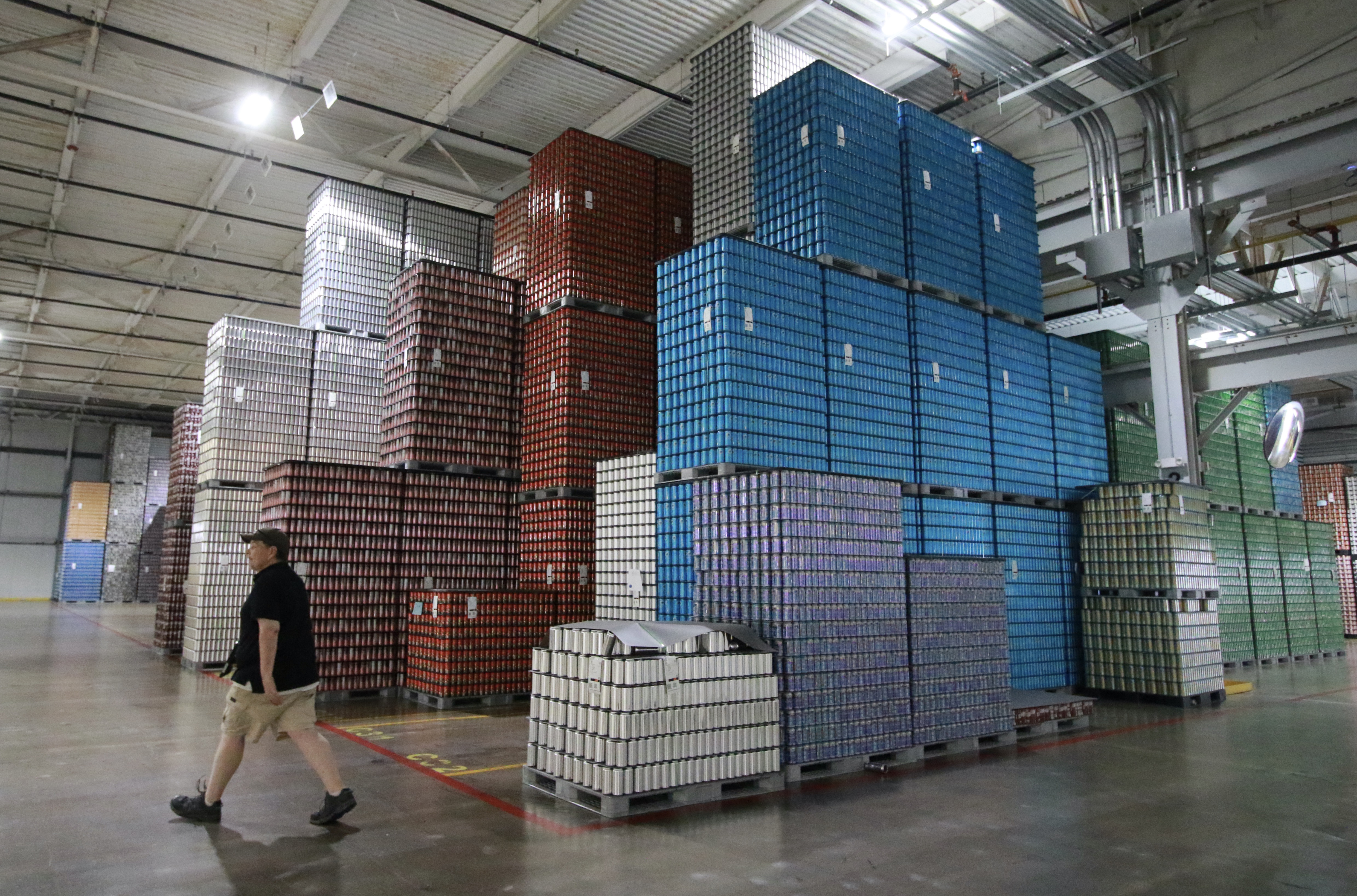Where does home affordability go from here?
Index of affordability in New Hampshire tied for poorest showing in 2025

Operations Manager Stephen Jade holds what will become a 16-ounce can at the cupper machine, which punches out cups from the aluminum roll stock. The cup is then sent to the bodymaker to be converted into a can. (Photo by Allegra Boverman)
The CEO of Can-One USA knows his company’s plant in Nashua can get a bit noisy, thanks to the air conditioning units on the roof. But it’s a lot noisier on the inside. Making aluminum cans is not a quiet business.
It gets a bit hot in there, too. Spend some time on the factory floor, and you might feel like cracking open a beer. But no dice. These guys just make empty cans. Their customers fill them with beer somewhere else.
Nestled near a residential neighborhood, the regional player in the aluminum beverage can industry has big plans for expansion to other parts of the United States.
Can-One USA began operations about 18 months ago at 141 Burke St., where it employs more than 120 people who make 12-ounce and 16-ounce cans, primarily for beer and other alcoholic beverages. The plant is the only aluminum can manufacturer in New England.
Can-One, whose corporate parent is based in Malaysia, aims to fill a niche created by the exit of another can manufacturer in Lawrence, Mass., in 2018, when Crown Holdings moved its operations to New York.
In the world of aluminum can production, the big players are known as the ABCs: Ardagh Group, Ball Corp.
and Crown. They’re the dominant players in a global market worth about $38 billion and projected to reach nearly $60 billion in 2030, driven by growth in carbonated soft drinks, beer and cider, according to industry research.
While the major players service big names like Coors and Anheuser-Busch, Can-One sees plenty of growth potential focusing on New England’s craft brewers.
“We want to service these small guys because the ABCs of the world, if you don’t have a contract that’s 50 million cans or more, they’ll shift you to a preferred broker network,” says Giovanni Di Mambro, who joined the company as CEO about eight months ago. “And then they won’t get the personalized concierge-level service that I think that we can offer.”
U.S. companies produce about 100 billion aluminum beverage cans a year, according to BevSource, which provides services to the beverage industry.

Giovanni Di Mambro joined Can-One USA as chief executive officer about eight months ago. In addition to working to expand operations in Nashua, he’s working with the company to open other plants in the United States. (Photo by Allegra Boverman)
“We think there’s probably 30 billion cans in the United States of craft beer business,” Di Mambro said. Based on population, he figures the Northeast accounts for about 7.5 billion of those cans. “If they know about us and they love our printed cans — and they’re going to fall in love with our pricing — I think we have a good future.”
Can-One renovated a 180,000-square-foot facility formerly occupied by Ingersoll-Rand that had been vacant since 2002. It produces 1.5 million cans a day, printing more than 500 unique can designs for producers of craft beer and other beverages. The company plans to install a second production line in 2027, which would allow it to produce more than 800 million cans a year.
While Can-One has the nimbleness of a startup, the company’s Malaysia-based parent, Can-One Berhad, is a global player in the packaging industry and counts Coke, Pepsi, Heineken and Nestle among its clients. The investment holding company operates 38 plants worldwide, producing metal, tin and plastic cans, and corrugated fiberboard cartons.
Can-One USA’s expansion, even as it ramps up production to meet local demand, is expected to quickly move beyond New England. Di Mambro, a veteran of the hospitality, food and beverage industry, has no experience in can production, but has expertise in city planning, urban design and architecture, he said.
“What attracted me was that this company has the plans to open up in, addition to this one, a minimum of three more locations around the country,” Di Mambro said. “I think they’re tapping into my real estate background, construction management background and architectural design background, in addition to operational background, to open up other locations for them.”
Can-One’s most likely next stop in the U.S. is down south and then west, he said.
“North Carolina is at the top of the list because it’s central. It gets us to the Southeast. It gets us pretty close maybe to Kansas City,” Di Mambro said. “For the next one, my advice to them would be maybe Arizona. It is very difficult to do business in California, so Arizona gives us an easy transportation access.”
Being close to its customers is an integral part of the business.
“Craft brewers have historically been very conscious of costs,” said Jim Demeritt, who recently joined the company as chief sales officer. “They have leaned into cans because it’s cost effective to ship them both empty and full. We don’t want to have customers in Colorado buying our cans, because shipping cans to Colorado is like shipping air, and it gets expensive.”
For now, the company is plenty busy trying to ramp up sales and production in Nashua. Can-One USA offers its customers options for quarter- and half-truckload deliveries, warehousing and can design. The Nashua plant, within 200 miles of five New England states, gives it a prime location to serve them.
The company has identified about 600 craft brewers in New England and about 400 specialty beverage makers, such as companies that make seltzers and kombucha.
“Our audience is about 1,000. We need to get in front of all of them,” Di Mambro said.

Jim Demeritt recently joined Can-One USA as chief sales officer. (Photo by Allegra Boverman)
Creating a workforce
About 80 to 90 of Can-One’s 120 employees work on the plant floor, where they operate sophisticated machines that work on the various stages of production.
Cans begin their journey as discs that are punched from giant rolls of aluminum sheeting. Other processes include cleaning, lining and printing.
In its early months, the company had difficulty attracting workers because it could only offer them 25 hours a week until demand ramped up enough to justify full-time work, Di Mambro said. But in recent months, the company has had success recruiting and retaining workers through a training program.
New England is home to about 20,000 manufacturing companies, which Di Mambro considers a good pipeline to secure workers.
“We have a rich tradition here in New England. We have access to a highly skilled workforce. Here in New Hampshire, it took a little bit longer,” he said. “When we first opened up, someone who is highly skilled, they won’t come and work for a startup.”
Stephen Jade, who previously worked for Crown Holdings in Lawrence and has more than 20 years of industry experience, was one of the first employees hired by Can-One USA. He remembers when the company reached 500,000 cans a day, and “everyone was excited.” But he was used to working at a plant that produced 5 million cans a day.
“It was excruciating for me, because I was so used to seeing the high speed,” said Jade, who recently was promoted to operations manager. “It’s just really getting the staff used to understanding what it feels like to run 1.5 (million) as opposed to half a million.”
Jade and other industry veterans who joined Can-One have become role models for the new recruits who might not have experience working in a can production plant. In Lawrence, he learned “off the backs of guys that were there for 30 years.”
Now it’s his turn to be a mentor. “All these guys came in, and there was a handful of us with experience. It’s been a lot, but it’s been fun,” he said.

Mat Miller uses a Sencon Enamel Rater to test the linings that have just been sprayed into cans at Can-One in Nashua. (Photo by Allegra Boverman)
Tempering tariffs
While the high demand for American-made aluminum can affect pricing, Can-One is somewhat insulated from tariffs, Di Mambro said.
“We’re shielded a little bit — we can pass that comfort along to our customers — because when we opened up two and a half years ago, the owners signed a long-term contract with the U.S.-based aluminum manufacturer,” he said.
He’s also not particularly worried with reports that alcohol sales are down, a trend that has been growing in recent years.
Alcohol consumption among adults in the U.S. is at the lowest level on record, according to a survey by analytics firm Gallup that was reported by Reuters in August.
Gallup’s annual Consumption Habits survey showed that about 54% Americans reported drinking alcohol, compared with 58% in 2024 and 62% in 2023.
That might cause some changes in the craft beer industry, Di Mambro acknowledged.

Finished pallets are stored in the warehouse at Can-One USA. (Photo by Allegra Boverman)
“We do hear about it, that there’s a contraction, but I see it more as a consolidation,” he said. “We’re in conversations with groups like Harpoon, Allagash and Boston Beer. They’re strategically finding the smaller craft brewers that they think have an upside to them, and they’ll go and bring them on board on the portfolio. And then things are reformulated, depending on demand. I don’t think society is drinking less; they’re just experimenting with other things.”
If the trend is away from alcohol, Can-One already has a good start. Among the cans displayed on the company’s conference room table to show off its customer base was one from Athletic Brewing Company — a craft beer maker that has found success making nonalcoholic IPAs.
“We have a small portion of that business,” Di Mambro said. But every can counts.